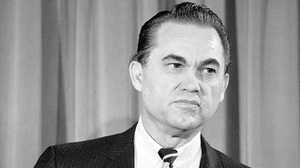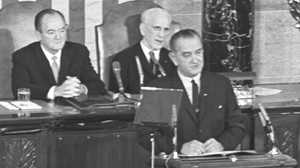Phone Call with McGeorge Bundy, 1964
Johnson speaks with Bundy about not selecting Robert Kennedy as his running mate.
Telephone conversation with McGeorge Bundy
Secretary: Mr. Bundy on line one.
Bundy: I know you've got people for lunch but he stopped by here on his way out and I wondered if you had any feeling as to how we could or should follow up or whether it's all settled. He talked to me as if he'd simply accepted the decision.
Johnson: He did to me and was very fine, very warm and he said that he had understood before he came over here that this is what it might be. I said, well now, nobody knows you're even coming, except Jack Valenti and Mac Bundy and neither one of them, I'm sure, knew what I was going to say or anything to do with it.
Bundy: He and I... He told me he thought this was it last night and that's what he's talking about.
Johnson: Well I said first -- I'll give you the longer after lunch, but I'll give you this rundown -- I said I want you to know that I've been concerned about a matter that's of interest to you and to me. I've given a lot of thought since the convention and Goldwater's nomination. I put myself in your place, assumed you were in my place, figured out how would I want this handled if our positions were reversed. I've concluded you should here it from me, direct, first. I've reached the decision, that it would be inadvisable for you to be a candidate for the number two spot, this year. My reasons for it are as follows: in light of Goldwater's nomination, I think that the battleground is going to be the border states, the states of Oklahoma and Maryland and Kentucky, and the Midwestern states. I have talked to all the leaders in every state either through myself or one of my intimate staff members. I've gotten their views. I feel like that this is not the time for you, if you have ambitions to lead the country, to go after this spot. President Kennedy always wondered how I could endure it. He said it must be very frustrating. I told him I wanted to more or less retire from the Senate, I certainly did. I felt like I ought to do what's good for my country and good for my party and good for my state and I thought the Democrats much more preferable than Nixon and that's why I did it. And I said I don't think that you'd be very happy there although I'm not in charge of your happiness. Presiding over situations in the Senate you couldn't do a damn thing about. Now I want you to be happy and do what you want to do. Our objectives are the same: carrying out President Kennedy's program. I want to pass 25 of his 35 major bills the first year. The next year I want to pass the other ten if I'm here and extend them. I've got his people carrying on, just like if he was here. I only have three people, George Reedy, Bill Moyers, Jack Valenti and Walter Jenkins, four of them. The other departments... Bundy runs his shop even more so then he did when Kennedy was here, [inaudible] does the same, Feldman does the same, Dungan does the same and we'll continue that way. I want you to direct the campaign, I want you to do anything else that you'd like to do. And appoint regional men, working out your relationship with them or carrying on where you are or going to any foreign spot that you would like to or taking any place in the government that's available. I don't mean I'd throw a cabinet officer out, but I would try to work it out. I want to get along better with your staff. I need your help. I think you're brilliant. I think you're dedicated. I think that you're good for the country. I think you'd be good for me when needed.
He said, "Well I want to help any way I can, the rest of the campaign. I don't know what I'll do after that. I don't guess I could do it from where I am because I don't guess any precedence and I haven't felt the attorney general ought to be in politics. They'd say that I'm supposed to be handling racial matters, not here running a campaign. But how are we going to announce this?"
I said, "Any way you want to."
He said, "Well I'll have to think that over."
And I said, "Alright, you can say that you are not interested in doing this. You can say that I thought because of the circumstances that developed, the areas of the country where the battleground is going to be, that I ought to give some attention there.
He said, "Did you decide who it's going to be?"
I said, "No, I've decided several that I don't think that fit in and I haven't decided the ultimate, the one. I don't think it ought to be done until I get the convention, and I think it ought to be done kind of like President Kennedy did.
I said, "That would be very desirable if you could say it at 4:30 that afternoon. That's what he did. I don't want to have anymore problems than I've already got. I wish you'd be thinking about Ken O'Donnell and Larry O'Brien and Jim Rowe and these folks, what you could put them to doing and call in John Connally.
He said, "Who have you thought of succeeding me?"
I said, "We don't have anybody."
He said, "Well I'd like you to give consideration to Katzenbach."
I said, "I'd be glad to do that."
He got up walked to the door, and got to the door and turned around and said, "Well I could have been a hell of a lot of help to you. If you'd have asked my opinion, I would have told you that I could have been a hell of a lot of help to you." Meaning if he'd have gotten on to the ticket, I assume. Well it looked that way.
And I said, "Well you are going to be a hell of a lot of help to me, the way I've outlined it." And then I hesitated a moment and he smiled and I smiled and I said, "A hell of a lot of help to yourself."






